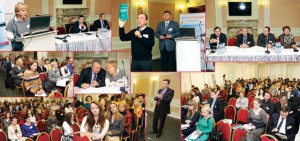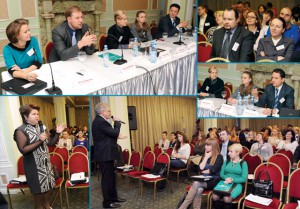News date: 18 November 2013


The conference discussed new opportunities for pharmaceutical marketing in Ukraine offered by the recently adopted Code of Good Promotional Practice for Medicinal Products, addressing the experiences and perspectives of regulatory changes in pharmaceutical marketing in the EU and CIS. The speakers also presented examples of effective business solutions for marketing pharmaceuticals.
In these discussions, pharmaceutical market operators were joined by experts, regulatory agencies officials and members of the general public from Yaroslav the Wise National Law Academy of Ukraine, non-governmental organizations, law firms and the media.
Ilyashev and Partners’ attorney and patent counsel Iryna Kirichenko also spoke at the conference addressing regulatory enforcement matters related to pharmaceutical marketing in Ukraine. Ms. Kirichenko argued that appropriate methods of promotion of pharmaceuticals must be suited to their reasonable and practical use. Advertising of drugs is an important element of promotion that presents information about pharmaceuticals in a more aesthetical form, often with an emotional touch. She said there was a backside of success of most heavily advertised drugs, which, in turn, can catch the eye of supervisory agencies with a remit to regulate anti-competitive conduct and monitor compliance with advertising laws. The first in the row is the Antitrust Committee of Ukraine (AMKU) that may penalize market players for disseminating information which is misleading or likely to mislead (false, inaccurate or incomplete information about a medicinal product). This also applies to product information for healthcare professionals. Penalties for misrepresentation are determined by the Antitrust Committee and may reach 5% of the sales revenue for the product or service concerned received in the last fiscal year, i.e. the year preceding the year in which the penalty is administered. The Committee releases annual reports on the work it carries within its competence. In 2012, for example, violators of antitrust law have paid to the budget the total of ca. UAH 40 Million in penalties and fines, almost twice as more as in 2011. Basing on that trend, Ms. Kirichenko suggested that Committee’s 2013 annual report might contain even more impressive amounts of penalties levied upon violators.
In 2012, dissemination of misleading information accounted for 91% of the total unfair competition practices, while the share of violations relating to the unauthorized use of signs, promotional materials and packages was only 5%.
The Office of Consumer Protection is yet another official consumer watchdog authorized to control compliance with technical regulations and standards. The Office may also fine market players for improper advertising of medicinal products. However, any penalties of the Office of Consumer Protection can be challenged by establishing to the satisfaction of the court that the use of certain data or statements regarding the properties of the drug is in line with the law.
Ms. Kirichenko gave a couple of cases regarding violations of Ukrainian advertising laws. So, for example, in 2007, Donetsk Department of Consumer Protection imposed a fine on a healthcare provider in Donetsk for outdoor advertising allegedly violating Section 21(7) of the Advertising Act. This section prohibits the use of physicians and other healthcare professionals as well as any persons whose appearance resembling that of doctors in advertising of medicinal products, medical equipment and methods of prevention, diagnostics, treatment and rehabilitation.
Meanwhile, the ad on a billboard has only advertised the healthcare provider, featuring the image of its founder and managing director holding a higher doctoral degree in medicine. There was absolutely no advertising of “medicinal products, medical equipment, methods of prevention, diagnostics, treatment and rehabilitation”. There is no provision in the Advertising Act prohibiting the use of doctors in the advertising of healthcare providers or any other institutions.
The decision was motivated by references to reliable dictionaries and encyclopedias providing unambiguous interpretation of “treatment”, “prevention”, “diagnostics” and “rehabilitation” which enabled the court to arrive at a reasonable conclusion on whether there was a breach of Section 21(7) of the Advertising Act.
Given the above, in its judgment in case 3/131а made on June 11, 2007 Donetsk Oblast Commercial Court ruled that the decision of the Department of Consumer Protection imposing a penalty for the alleged violation of advertising shall be set aside as being in conflict with law.
This and other examples of regulatory enforcement show that, in case of an investigation, the ability of a drug advertiser to provide proper motivation of the claim and prepare a set of right questions for experts is what can secure his defense against the sweeping accusations of dissemination of misleading information.
Summing up, we would like to say that the specialized focus conference “Pharma Marketing in Ukraine. New rules 2013. Current practices” has become a powerful forum to discuss new opportunities for marketing medicinal products in Ukraine. According to the participants of the event, the new guidelines will help increase the effectiveness of promotional activities by pharmaceutical companies which, of course, are the most important investors in the healthcare system of Ukraine.